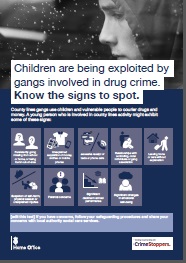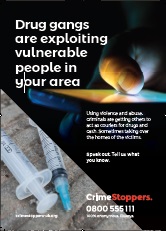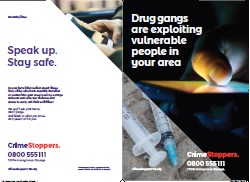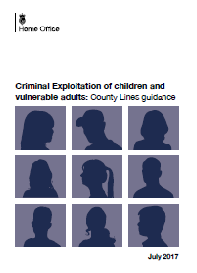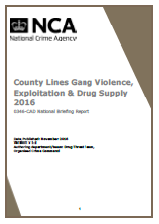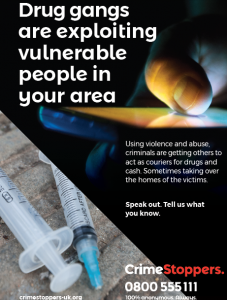County Lines – Child Criminal Exploitation
What is Child Criminal Exploitation?
While there is still no legal definition of ‘Child Criminal Exploitation’ or CCE, it is increasingly being recognised as a major factor behind crime in communities across Merseyside and the UK, while also simultaneously victimising vulnerable young people and leaving them at risk of harm.
CCE often occurs without the victim being aware that they are being exploited and involves young people being encouraged, cajoled or threatened to carry out crime for the benefit of others. In return they are offered friendship or peer acceptance, but also cigarettes , drugs (especially cannabis), alcohol or even food and accommodation.
Children as young as 10 or 11 are being groomed to enter gangs and commit crime on behalf of older criminals. These young people are being exploited and, by being persuaded or lured into carrying out illegal activities, often with the promise of something they desire as a reward, they become incredibly vulnerable.
Victims of CCE are often fearful of getting into trouble themselves – for the very actions they have been exploited into carrying out – so it can also be difficult to get these young people to come forward and speak out about their situation
What is County Lines?
County lines is a term used to describe gangs, groups or drug networks that supply drugs from urban to suburban areas across the country, including market and coastal towns, using dedicated mobile phone lines or ‘deal lines’. They exploit children and vulnerable adults to move the drugs and money to and from the urban area, and to store the drugs in local markets. They will often use intimidation, violence and weapons, including knives, corrosives and firearms.
County lines is a major, cross-cutting issue involving drugs, violence, gangs, safeguarding, criminal and sexual exploitation, modern slavery, and missing persons; and the response to tackle it involves the police, the National Crime Agency, a wide range of Government departments, local government agencies and voluntary and community sector organisations. County lines activity and the associated violence, drug dealing and exploitation has a devastating impact on young people, vulnerable adults and local communities.
Spotting the Signs
A young person’s involvement in county lines activity often leaves signs. A young person might exhibit some of these signs, either as a member or as an associate of a gang dealing drugs. Any sudden changes in a young person’s lifestyle should be discussed with them. Some indicators of county lines involvement and exploitation are listed below, with those at the top of particular concern:
- Persistently going missing from school or home and / or being found out-of-area;
- Unexplained acquisition of money, clothes, or mobile phones
- Excessive receipt of texts / phone calls
- Relationships with controlling / older individuals or groups
- Leaving home / care without explanation
- Suspicion of physical assault / unexplained injuries
- Parental concerns
- Carrying weapons
- Significant decline in school results / performance
- Gang association or isolation from peers or social networks
- Self-harm or significant changes in emotional well-being
A Spotting the signs poster can be downloaded below:
Merseyside Police
The North West Regional Organised Crime Unit (TITAN), has launched a regional campaign to publicise the issue of ‘County Lines’. The campaign is being developed to create a multi-agency approach which targets young people, parents, general public, care home staff, Merseyside Police Officers / staff, health care professionals and teachers to create a talking point about the signs and triggers of vulnerable adults and young people being exploited to deliver drugs, and the relevant reporting mechanisms.
The victims can be anyone in the community, as young as 10 or as old as 90, criminal gangs exploit vulnerability in all its forms to aid their activities. It can only be combatted if the public understand what it is, knows how to spot the signs and knows what to do if they think a person they know is being exploited. Intelligence from our communities is key to the police taking out the gangs responsible for this exportation of crime and exploitation of the vulnerable
Local forces and Titan have joined together with Crimestoppers to raise awareness of the signs and symptoms to look out for and how the public can help by sharing information anonymously.
Reporting Concerns
Professionals should follow there usual safeguarding procedures. Safeguarding concerns about children and young people should be reported into the Integrated Front Door
Intelligence and information about crimes can be reported anonymously to Crimestoppers on 0800 555111 or by phoning the police on 101
Discontinuation of the PAiR system
Merseyside Police have a nationwide Crimestoppers telephone number which colleagues from partner agencies and members of the public can use to report intelligence. Crimestoppers is well established and replaces the PAiR (Partnership Automated Intelligence Reporting) system which has now been discontinued.
Merseyside Police have published a short video about the decommissioning of the PAiR system and the use of Crimestoppers. It is designed for all multi-agency professionals and can be viewed below or downloaded to be used in agencies.
The Crimestoppers number is 0800 555 111 (website: https://crimestoppers-uk.org/). Crimestoppers can be used to report intelligence which will support action to combat CSE, such as information about suspected perpetrators. However, it must not be used to report safeguarding concerns about individual children. These must be reported to the Integrated Front Door (0151 606 2008) in line with safeguarding procedures.
If at any time you believe a child is being harmed or at immediate risk of harm always dial 999.
Resources
Leaflets and posters to help raise awareness of County Lines are available for you to download below:
Training
It is recommended that professionals attend the multi-agency Child Sexual Exploitation training as this includes a section on criminal exploitation book your CSE training here


